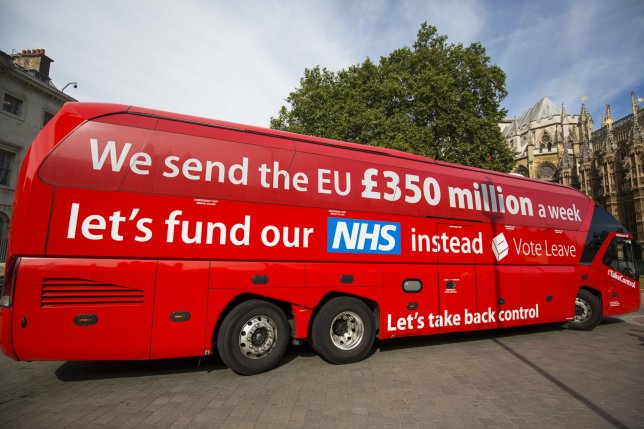WORLD VIEW: Democracys chronic pains
Brexit lies
By Jonathan Power
In the Western world there is a constant debate about democracy. In the US the Democrats charge quite correctly that the House’s constituencies are gerrymandered against them. Then there’s the insoluble issue of the Senate’s anti-democratic bias where its numbers are tilted against the Democrats by the fact that rural, less populated, states which tend to be conservative, elect two senators, just as do the Democratic-inclined, heavily populated, states.
In Britain, the country is riven by the Brexit debate. A referendum was held two and a half years ago when voters were given the choice of “Remain” or “Leave”. The “Leavers” won by a small margin and the country has been in political turmoil ever since. Now with Prime Minister Theresa May’s exit plans on the rocks the debate has become vitriolic. There are calls for a new referendum to reverse the previous vote. It’s likely to happen since Mrs May has been checkmated by the European Union. The Remainers will probably win.
In Hungary, the prime minister has pushed aside democracy to take more control of the press and the judiciary, despite threats, so far empty ones, from the rest of the EU to seriously punish its government.
In France, demonstrators, some violent, have hit the streets, protesting the government’s policies that seem to favor the well to do. In fact the poorer have also been helped. But is it a responsible protest when the mass of non-violent demonstrators know that their action has attracted young hooligans who use violence- burning cars, ransacking shops and fighting the police with cobblestones?
[caption id="attachment_92128" align="alignleft" width="300"] Robespierre's road to democracy[/caption]
Robespierre's road to democracy[/caption]
Democracy, considered a virtue, has always had its bad associates- Hitler and Robespierre for starters.
Democracy is in trouble, according to a new, incisive and broad ranging book, “Setting T he People Free- The Story Of Democracy”, by Cambridge professor, John Dunn. What’s excluded from his magisterial text isn’t worth knowing. His book gives the reader everything they need to know.
As Dunn writes, democracy has lost its clarity. It’s not yet a sinking ship but it certainly has hit an iceberg.
“Representative democracy today”, he says “works far better as a mechanism for rejection than it can as a way of choosing together what course to follow for any length of time”.
Dunn singles out climate change. Yes, there’s a great amount of lip service to taking drastic action but, as in France, when fuel taxes were raised in order to restrict more CO2 emissions, there are massive demonstrations against it. A democratically elected government was compelled to retreat.
[caption id="attachment_91090" align="alignright" width="300"] Trump . climate change denier[/caption]
Trump . climate change denier[/caption]
In the US Republican voters support President Donald Trump’s policy of denial although the denials came from a time well before Trump. Dunn says that in the face of such immense challenges the record of Western democracies “has been at best uneven and at worst abominable.” Our democracies, he concludes, exist in “muted form”. At the end of his book he blames us the voters for tolerating bad practices.
Plato, who opposed the other Greek savants, his teacher, Socrates, and his pupil, Aristotle, denounced democracy. He saw it as “a presumptuous and grossly ugly idea”. He blamed the killing of Socrates on the waywardness of democratic governance.
This and other historical examples leads Dunn to argue that with democracy “it’s overwhelmingly probable that many particular outcomes will turn out to be flagrantly unjust. The idea of justice and the idea of democracy fit very precariously together”. Worse still, “It’s often sharply at odds with the requirements for the fluent operation of a capitalist economy”.
In post-Soviet Russia much of the West thought democracy would come first and capitalism second. It did for a while but now under President Vladimir Putin the order has been largely reversed.
Dunn goes on to say provocatively that, “No one could readily mistake democracy for a solution to the Riddle of History”.
Nevertheless, “In its simple and unpretentious way, it has by now established a clear claim to meet a global need better than any of its competitors. It has a unique status, fusing timeliness and well-considered modesty with a claim to something very close to indispensability”.
Having said this we are living in a disenchanted and demoralized world. Our prime purpose isn’t democracy, fighting for human rights, against climate change or for compassion towards the poor. Our lives appear to be organized around the struggle to maximize personal income.
One of both the ingredients and the result of this is to make us shortsighted and to have little sense of history. In the American case, Trump plays on the sheer ignorance of a large section of the electorate. In Britain, Nigel Farge and his United Kingdom Independence Party and friends in the Conservative Party told outright lies, now admitted, to the voters in order to win the Brexit referendum.
We sigh and take comfort from what Churchill said: “Democracy is the worst form of government except all those other forms that have been tried from time to time”.
